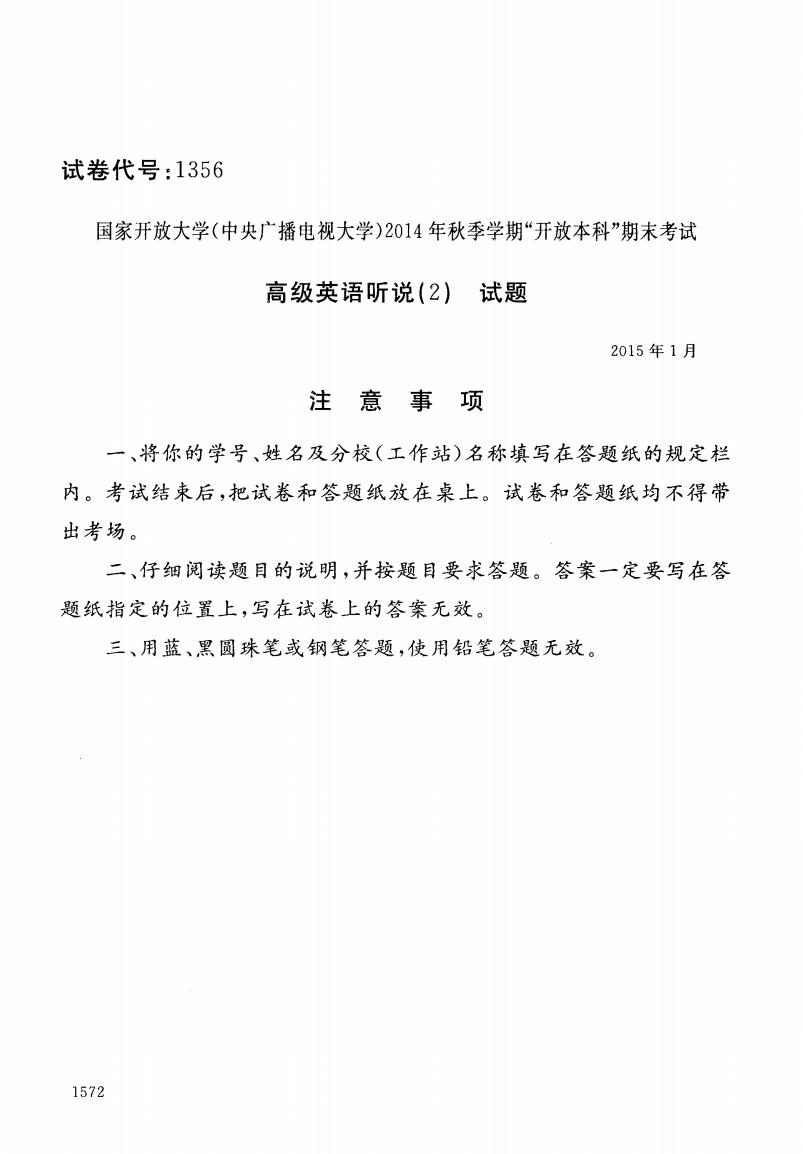
试卷代号:1356 国家开放大学(中央广播电视大学)2014年秋季学期“开放本科”期末考试 高级英语听说(2)试题 2015年1月 注意事项 一、将你的学号、姓名及分校(工作站)名称填写在答题纸的规定栏 内。考试结束后,把试卷和答题纸放在桌上。试卷和答题纸均不得带 出考场。 二、仔细阅读题目的说明,并按题目要求答题。答案一定要写在答 题纸指定的位置上,写在试卷上的答案无效。 三、用蓝、,黑圆珠笔或钢笔答题,使用铅笔答题无效。 1572
试卷代号 :1356 国家开放大学(中央广播电视大学 )2014 年秋季学期"开放本科"期末考试 高级英语昕说 (2 ) 试题 2015 注意事项 一、将你的学号、姓名及分校(工作站)名称填写在答题纸的规定栏 内。考试结束后,把试卷和答题纸放在桌上。试卷和答题纸均不得带 出考场。 二、仔细阅读题目的说明,并按题目要求答题。答案一定要写在答 题纸指定的位置上,写在试卷上的答案无效。 三、用蓝、黑圆珠笔或钢笔答题,使用铅笔答题无效。 1572
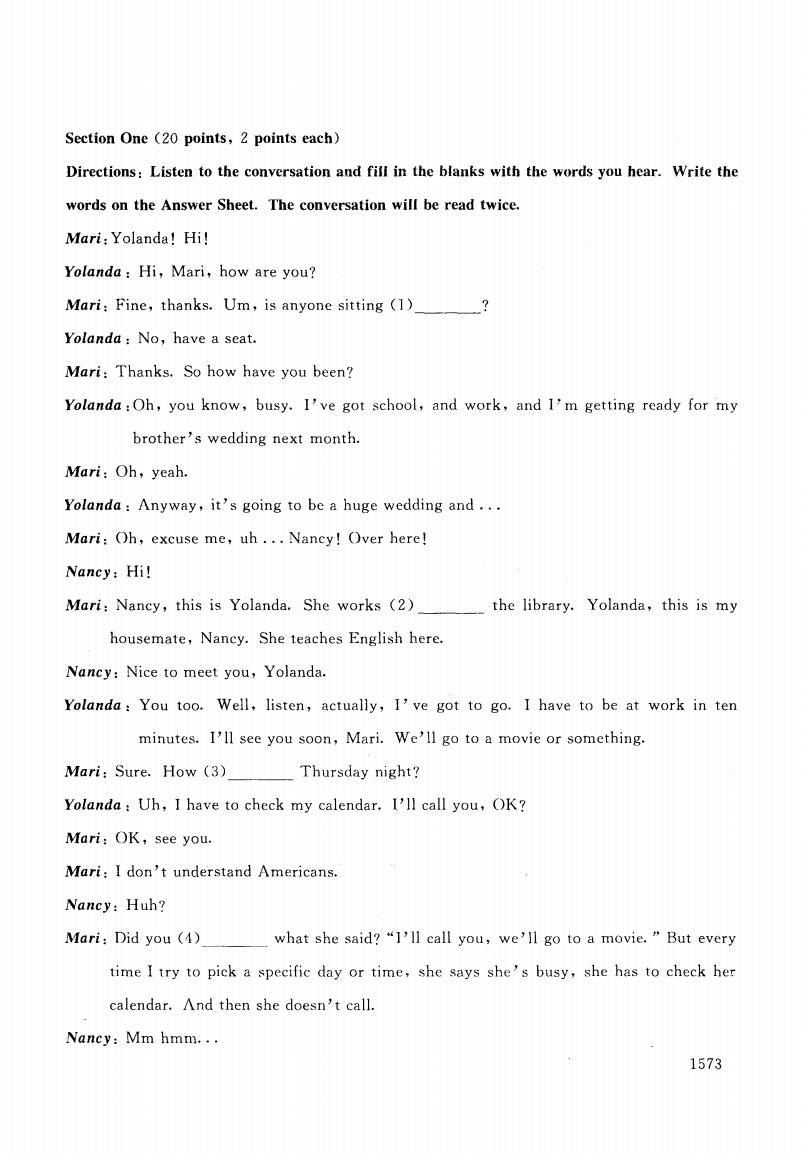
Section One (20 points,2 points each) Directions:Listen to the conversation and fill in the blanks with the words you hear.Write the words on the Answer Sheet.The conversation will be read twice. Mari:Yolanda!Hil Yolanda:Hi,Mari,how are you? Mari:Fine,thanks.Um,is anyone sitting (1) Yolanda:No,have a seat. Mari:Thanks.So how have you been? Yolanda:Oh,you know,busy.I've got school,and work,and I'm getting ready for my brother's wedding next month. Mari:Oh,yeah. Yolanda:Anyway,it's going to be a huge wedding and... Mari:Oh,excuse me,uh..Nancy!(Over here! Nancy:Hi! Mari:Nancy,this is Yolanda.She works (2)the library.Yolanda,this is my housemate,Nancy.She teaches English here. Nancy:Nice to meet you,Yolanda. Yolanda:You too.Well,listen,actually,I've got to go.I have to be at work in ten minutes.I'll see you soon,Mari.We'll go to a movie or something. Mari:Sure.How (3)Thursday night? Yolanda:Uh,I have to check my calendar.I'll call you,OK? Mari:OK,see you. Mari:I don't understand Americans. Nancy:Huh? Mari:Did you (4) what she said?"I'll call you,we'll go to a movie."But every time I try to pick a specific day or time,she says she's busy,she has to check her calendar.And then she doesn't call. Nancy:Mm hmm... 1573
Section One (20 points, 2 points each) Directions: Lísten to the conversation and filf in the blanks with the words you hear. Write the words on the Answer Sheet. The conversation wiIl be read twice. Mari: Yolanda! Hi! Yolanda: Hi , Mari , how are you? Mari: Fine , thanks. U m , is anyone sitting (1)一一一? Yolanda: No , have a seat. Mari: Thanks. So how have you been? Yolanda : Oh , you know , busy. l' ve got school , and work , and l' m getting ready for my brother' s wedding next month. Mari: Oh , yeah. Yolanda: Anyway , it's going to be a huge wedding and... Mari: Oh , excuse me , uh . . . N ancy! Over here! Nancy: Hi! Mari: Nancy , this is Yolanda. She works (2) 一一-一_ the library. Yolanda , this is my housemate , Nancy. She teaches English here. Nancy: Nice to meet you , Yolanda. Yolanda: You too. Well , listen , actually , l' ve got to go. 1 have to be at work in ten minutes. 1'11 see you soon , Mari. We' lI go to a movie or something. Mari: Sure. How (3) 一一~一一_ Thursday night? Yolanda: Uh , 1 have to check my calendar. l' 11 call you , OK? 1ari: OK , see you. Mari: 1 don' t understand Americans. Nancy: Huh? 1ari: Did you (1) 一一一 what she said? "1'11 call you , we' Jl go to a movie." But every time 1 try to pick a specific day or time , she says she' s busy , she has to check her calenda r.八 nd then she doesn' t call. Nancy: Mm hmm. 1573
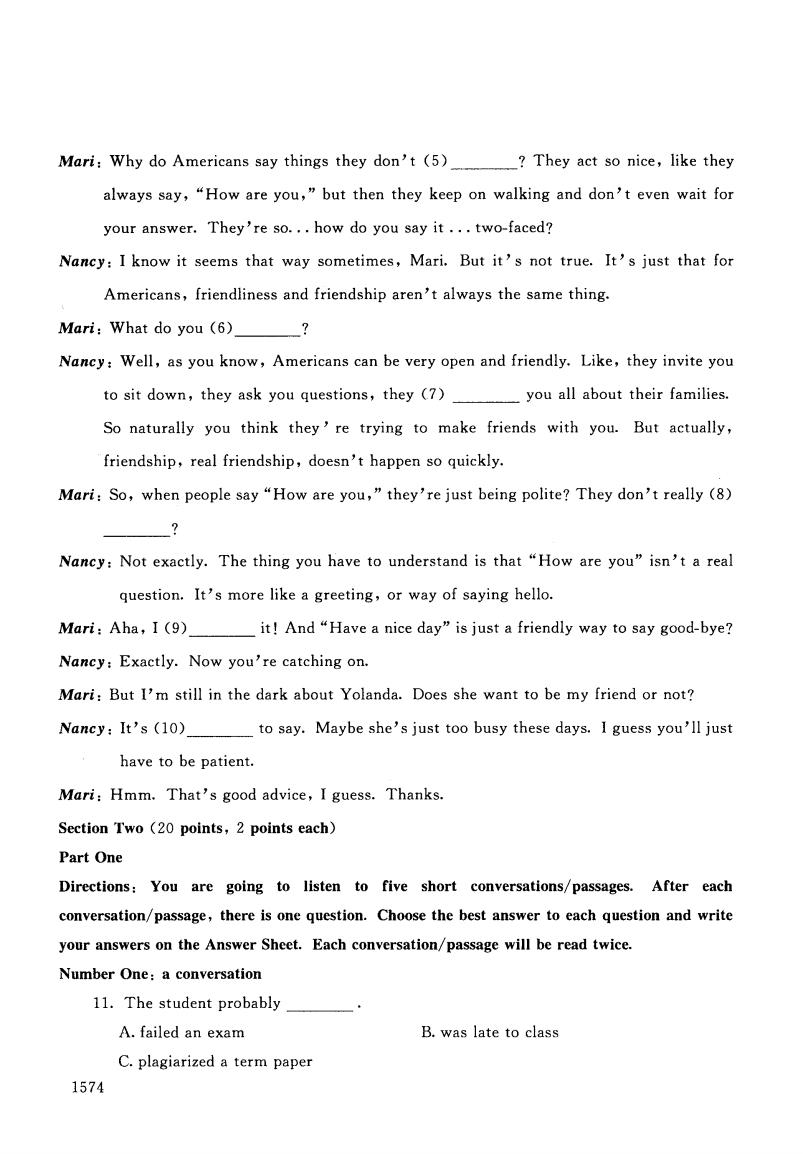
Mari:Why do Americans say things they don't (5)?They act so nice,like they always say,"How are you,but then they keep on walking and don't even wait for your answer.They're so...how do you say it...two-faced? Nancy:I know it seems that way sometimes,Mari.But it's not true.It's just that for Americans,friendliness and friendship aren't always the same thing. Mari:What do you (6)? Nancy:Well,as you know,Americans can be very open and friendly.Like,they invite you to sit down,they ask you questions,they (7) you all about their families. So naturally you think they're trying to make friends with you.But actually, friendship,real friendship,doesn't happen so quickly. Mari:So,when people say "How are you,they're just being polite?They don't really (8) Nancy:Not exactly.The thing you have to understand is that "How are you"isn't a real question.It's more like a greeting,or way of saying hello. Mari:Aha,I(9)it!And "Have a nice day"is just a friendly way to say good-bye? Nancy:Exactly.Now you're catching on. Mari:But I'm still in the dark about Yolanda.Does she want to be my friend or not? Nancy:It's (10) to say.Maybe she's just too busy these days.I guess you'll just have to be patient. Mari:Hmm.That's good advice,I guess.Thanks. Section Two (20 points,2 points each) Part One Directions:You are going to listen to five short conversations/passages.After each conversation/passage,there is one question.Choose the best answer to each question and write your answers on the Answer Sheet.Each conversation/passage will be read twice. Number One:a conversation 11.The student probably A.failed an exam B.was late to class C.plagiarized a term paper 1574
Mari: Why do Americans say things they don' t (5) 一一一一一一? They act so nice , like they always say , "How are you ," but then they keep on walking and don' t even wait for your answer. They're so.. . how do you say it . . . two-faced? Nancy: 1 know it seems that way sometimes, Mari. But it' s not true. It' s just that for Americans, friendliness and friendship aren' t always the same thing. Mari: What do you (6) 一一一一一一? Nancy: Well , as you know , Americans can be very open and friendly. Like , they invite you to sit down , they ask you questions, they (7)一一一一一 you all about their families. So naturally you think they' re trying to make friends with you. But actually , friendship , real friendship , doesn' t happen so quickly. Mari: So , when people say "How are you ," they'rejust being polite? They don't really (8) ? Nancy: Not exactly. The thing you have to understand is that "How are you" isn't a real question. It' s more like a greeting , or way of saying hello. Mari: Aha , 1 (9) it! And "Have a nice day" is just a friendly way to say good-bye? Nancy: Exactly. Now you're catching on. Mari: But l' m still in the dark about Yolanda. Does she want to be my friend or not? Nancy: It's (1 0) to say. Maybe she's just too busy these days. 1 guess you'll just have to be patient. Mari: Hmm. That's good advice , 1 guess. Thanks. Section Two (20 points, 2 points each) Part One Directions: You are going to Iisten to five short conversations/ passages. After each conversation/passage , there is one question. Choose the best answer to each question and write your answers on the Answer Sheet. Each conversationjpassage will be read twice. Number One , a conversation 11. The student probably 一一一一一一. A. failed an exam B. was late to class c. plagiarized a term paper 1574
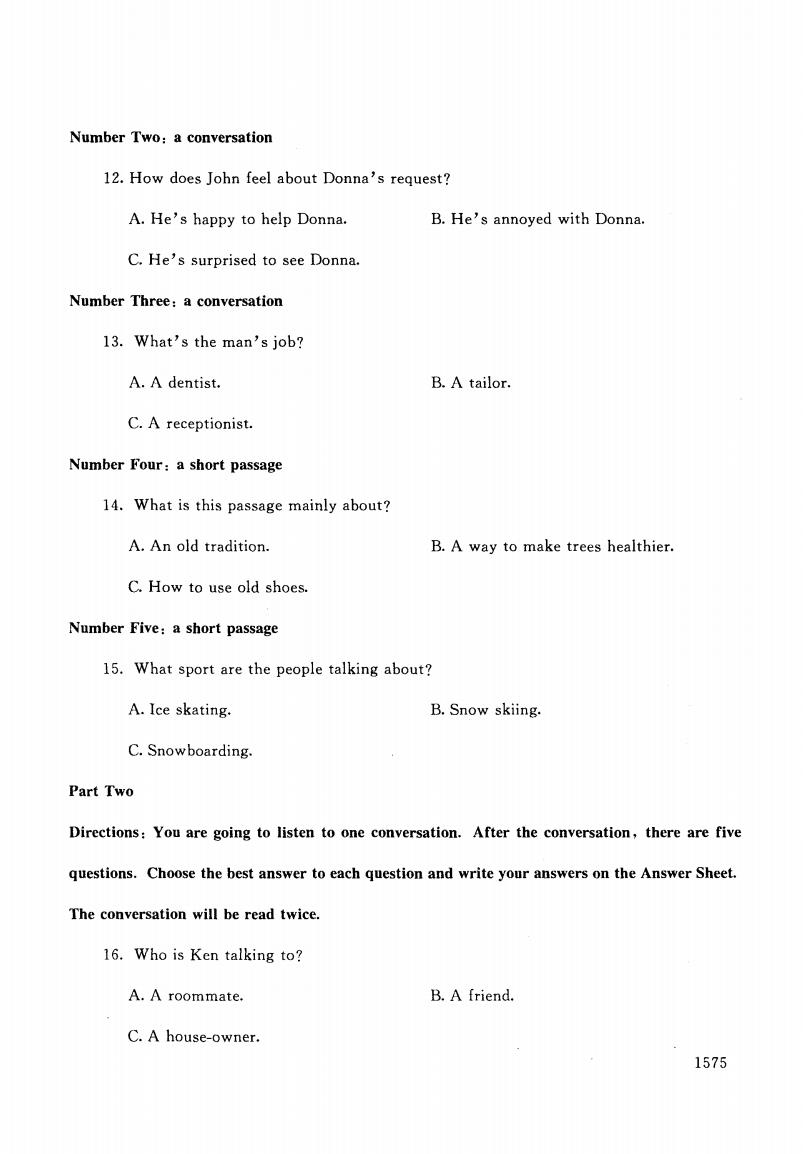
Number Two:a conversation 12.How does John feel about Donna's request? A.He's happy to help Donna. B.He's annoyed with Donna. C.He's surprised to see Donna Number Three:a conversation 13.What's the man's job? A.A dentist. B.A tailor. C.A receptionist. Number Four:a short passage 14.What is this passage mainly about? A.An old tradition. B.A way to make trees healthier. C.How to use old shoes. Number Five:a short passage 15.What sport are the people talking about? A.Ice skating. B.Snow skiing. C.Snowboarding Part Two Directions:You are going to listen to one conversation.After the conversation,there are five questions.Choose the best answer to each question and write your answers on the Answer Sheet. The conversation will be read twice 16.Who is Ken talking to? A.A roommate. B.A friend. C.A house-owner. 1575
Number Two: a conversation 12. How does John feel about Donna's request? A. He's happy to help Donna. C. He' s surprised to see Donna. Number Three: a conversation 13. What's the man's job? A. A dentist. C. A receptionist. Number Four: a short passage 14. What is this passage mainly about? A. An old tradition. C. How to use old shoes. Number Five: a short passage B. He' s annoyed with Donna. B. A tailor. B. A way to make trees healthier. 15. What sport are the people talking about? A. Ice skating. B. Snow skiing. C. Snowboarding. Part Two Directions: You are going to Iisten to one conversation. After the conversation , there are five questions. Chωse the best answer to each question and write your answers on the Answer Sheet. The conversation will be read twice. 16. Who is Ken talking to? A. A roommate. C. A house-owner. B. A friend. 1575
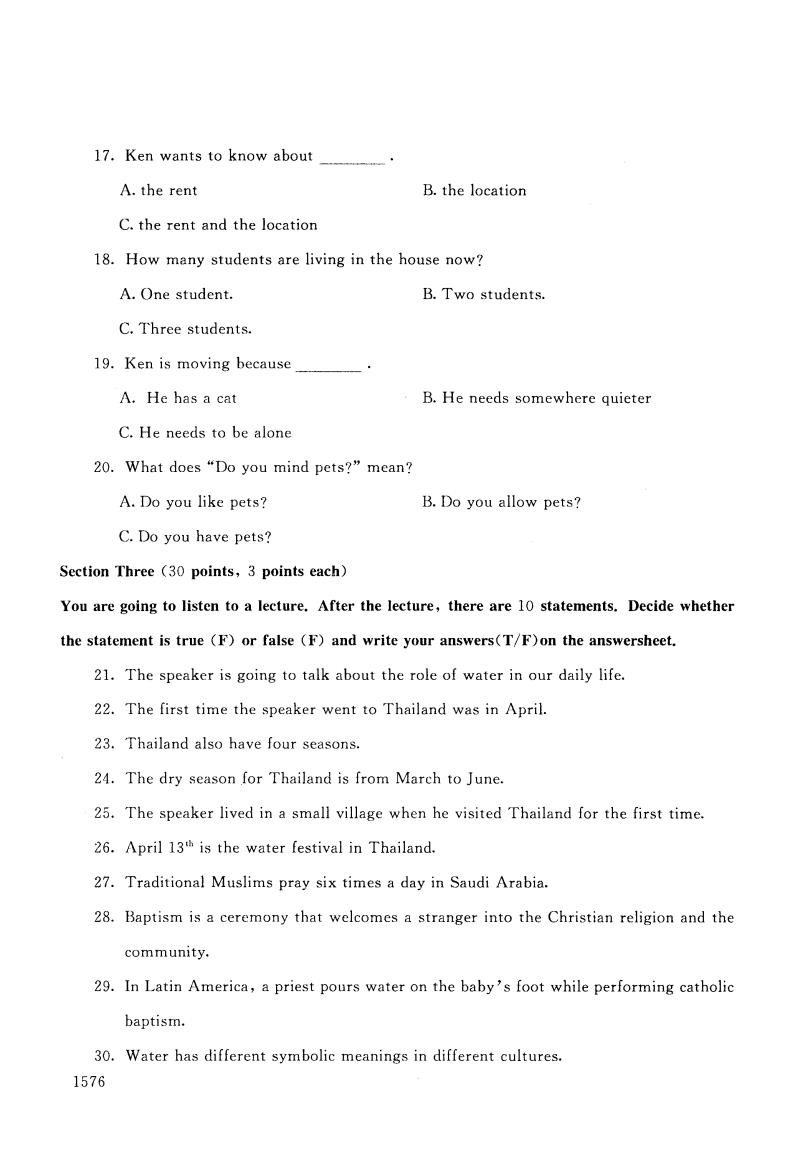
17.Ken wants to know about A.the rent B.the location C.the rent and the location 18.How many students are living in the house now? A.One student. B.Two students. C.Three students. 19.Ken is moving because A.He has a cat B.He needs somewhere quieter C.He needs to be alone 20.What does“Do you mind pets?”mean? A.Do you like pets? B.Do you allow pets? C.Do you have pets? Section Three (30 points,3 points each) You are going to listen to a lecture.After the lecture,there are 10 statements.Decide whether the statement is true (F)or false (F)and write your answers(T/F)on the answersheet. 21.The speaker is going to talk about the role of water in our daily life. 22.The first time the speaker went to Thailand was in April. 23.Thailand also have four seasons. 24.The dry season for Thailand is from March to June. 25.The speaker lived in a small village when he visited Thailand for the first time. 26.April 13th is the water festival in Thailand. 27.Traditional Muslims pray six times a day in Saudi Arabia. 28.Baptism is a ceremony that welcomes a stranger into the Christian religion and the community. 29.In Latin America,a priest pours water on the baby's foot while performing catholic baptism. 30.Water has different symbolic meanings in different cultures. 1576
17. Ken wants to know about A. the rent B. the location C. the rent and the location 18. How many students are living in the house now,! A. One student. B. Two students. C. Three students. 19. Ken is moving because 一一一一一一· A. He has a cat B. He needs somewhere quieter C. He needs to be alone 20. What does "Do you mind pets?" mean? A. Do you like pets? B. Do you allow pets? C. Do you have pets? Section Three (30 points, 3 points each) You are going to Iistcn to a lecture. After the lecture , there are 10 statements. Decide whether the statement is true (F) or false (F) and write your answers (T /F) on the answersheet. 21. The speaker is going to talk about the role of water in our daily life. 22. The first time the speaker went to Thailand was in April. 23. Thailand also have four seasons. 24. The dry season for Thailand is from March to J une. 25. The speaker lived in a small village when he visited Thailand for the first time. 26. April 13th is the water festival in Thailand. 27. Traditional Muslims pray six times a day in Saudi Arabia. 28. Baptism is a ceremony that welcomes a stranger into the Christian religion and the commumty. 29. In Latin America , a priest pours water on the baby' s foot while performing catholic baptism. 30. Water has different symbolic meanings in different cultures. 1576
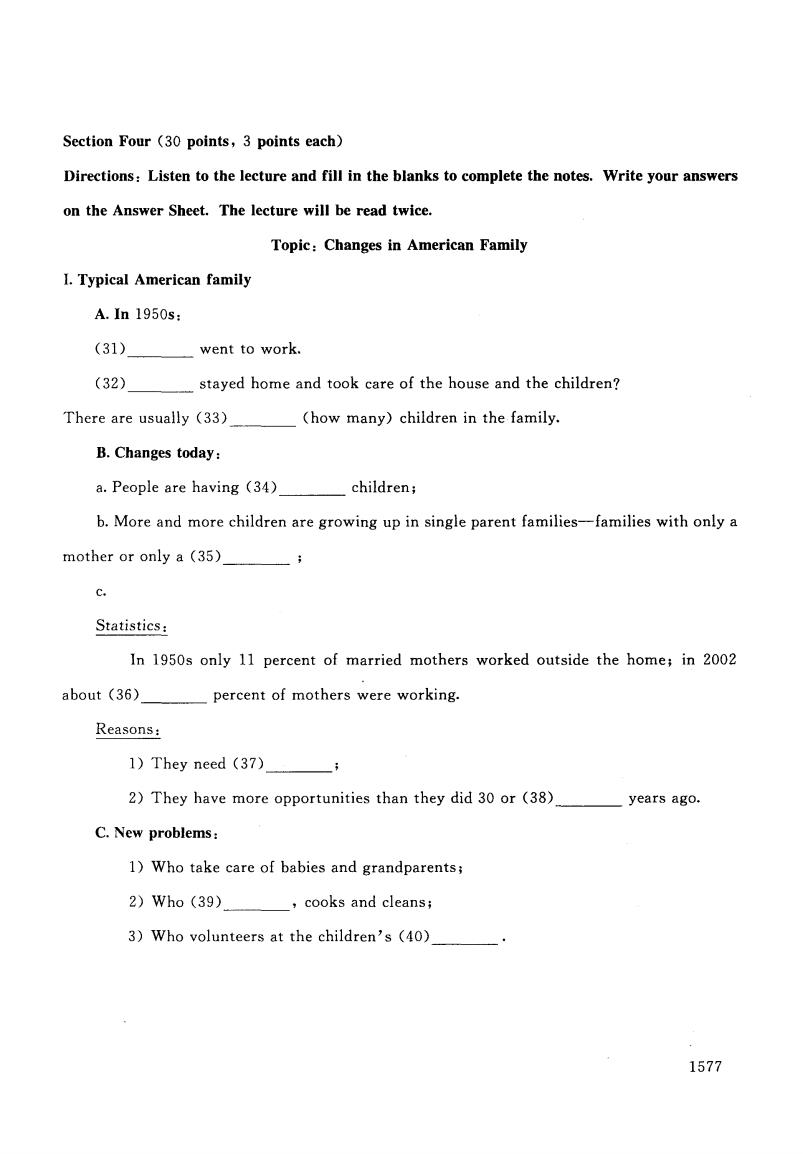
Section Four (30 points,3 points each) Directions:Listen to the lecture and fill in the blanks to complete the notes.Write your answers on the Answer Sheet.The lecture will be read twice. Topic:Changes in American Family I.Typical American family A.In1950s: (31) went to work. (32) stayed home and took care of the house and the children? There are usually (33) (how many)children in the family. B.Changes today: a.People are having (34) children; b.More and more children are growing up in single parent families-families with only a mother or only a(35) C. Statistics: In 1950s only 11 percent of married mothers worked outside the home;in 2002 about (36) percent of mothers were working. Reasons: 1)They need (37) 2)They have more opportunities than they did 30 or (38) years ago. C.New problems: 1)Who take care of babies and grandparents; 2)Who(39) cooks and cleans; 3)Who volunteers at the children's (40) 1577
Section Four (30 points, 3 points each) Directions: Listen to the lecture and fi11 in the blanks to complete the notes. Write your answers on the Answer Sheet. The lecture will be read twice. 1. Typical American family A.ln 1950s: Topic: Changes in American Family (31) went to work. (32) stayed home and took care of the house and the children? There are usually (33) 一--一一 (how many) children in the family. B. Changes today: a. People are having (34) 一一一-一 children; b. More and more children are growing up in single parent familìes-families with only a mother or only a (3 5) 一一一 c. Statistics, In 1950s only 11 percent of married mothers worked outside the home; in 2002 about (36) 一一一一一 percent of mothers were working. Reasons: 1) They need (3 7) 2) They have more opportunities than they did 30 or (38)_一一一一一_ years ago. C. New problems: 1) Who take care of babies and grandparents; 2) Who (39) , cooks and cleans; 3) Who volunteers at the children' s (40) 1577
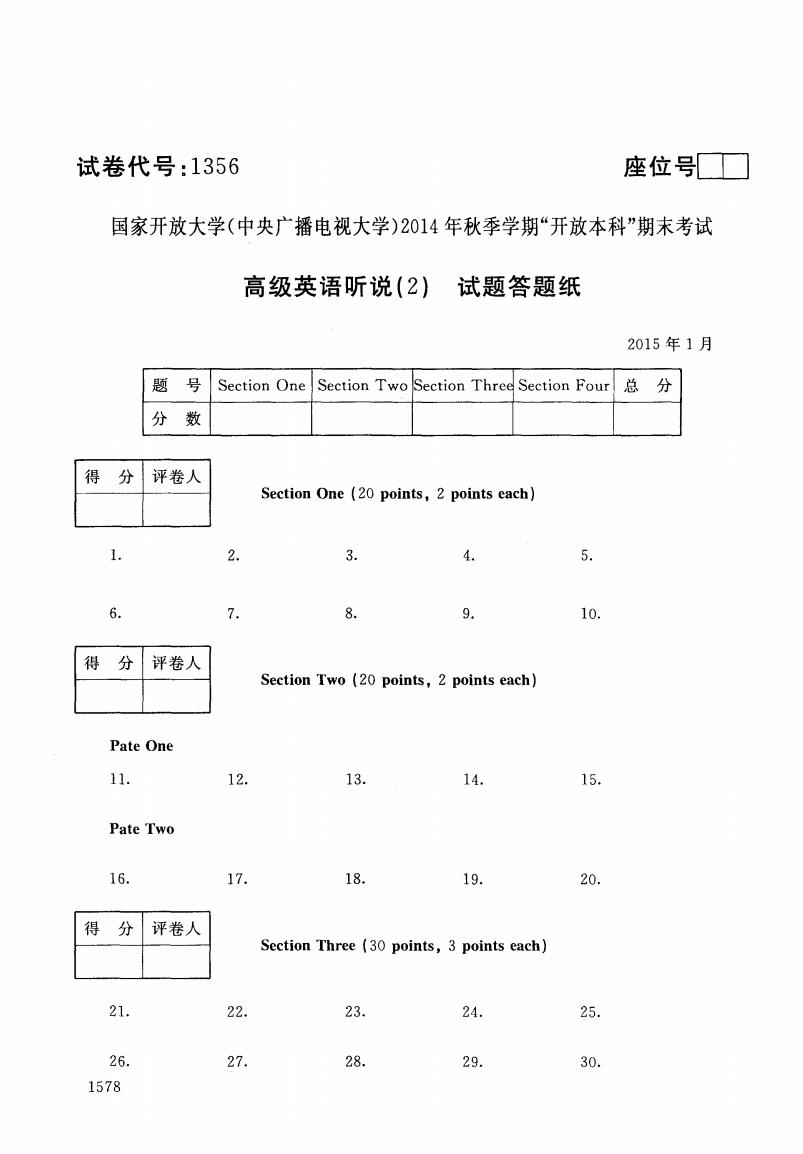
试卷代号:1356 座位号☐ 国家开放大学(中央广播电视大学)2014年秋季学期“开放本科”期末考试 高级英语听说(2) 试题答题纸 2015年1月 题号 Section One Section Two Section Three Section Four 总 分 分数 得分 评卷人 Section One (20 points,2 points each) 2. 3. 4. 5 6. 7. 8. 9 10. 得分 评卷人 Section Two (20 points,2 points each) Pate One 11. 12. 13. 15. Pate Two 16. 17. 18. 19. 20. 得分 评卷人 Section Three (30 points,3 points each) 21. 22. 23. 24. 25. 26. 27. 28. 29. 30. 1578
试卷代号 :1356 座位号rn 国家开放大学(中央广播电视大学)2014 年秋季学期"开放本科"期末考试 6. Pate One 11. Pate Two 16. 21. 26. 1578 高级英语昕说 (2 ) 试题答题纸 2015 Section One I Section Two ISection Thred Section Four Section One (20 points, 2 points each) 2. 3. 4. 5. 7. 8. 9. 10. Section Two (20 points, 2 points each) 12. 13. 14. 15. 17. 18. 19. 20. Section Three (30 points, 3 points each) 22. 23. 24. 25. 27. 28. 29. 30

得分 评卷人 Section Four (30 points,3 points each) 31. 32. 33. 34. 35. 3 37. 3 39. 40. 、 1579
31. 33. 35. 37. 39. Section Four (30 points. 3 points each) 32. 34. 36. 38. 40. 1579
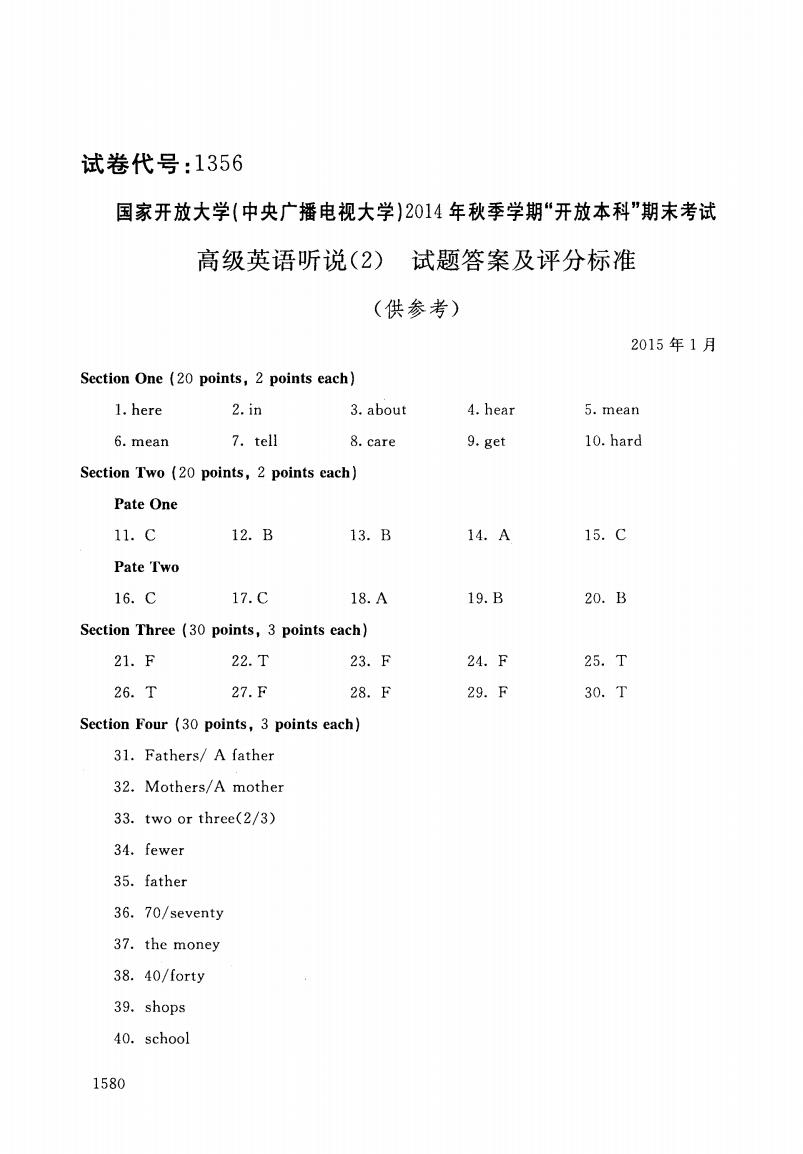
试卷代号:1356 国家开放大学(中央广播电视大学)2014年秋季学期“开放本科”期末考试 高级英语听说(2)试题答案及评分标准 (供参考) 2015年1月 Section One (20 points,2 points each) 1.here 2.in 3.about 4.hear 5.mean 6.mean 7.tell 8.care 9.get 10.hard Section Two (20 points,2 points each) Pate One 11.C 12.B 13.B 14.A 15.C Pate Two 16.C 17.C 18.A 19.B 20.B Section Three(30 points,3 points each) 21.F 22.T 23.F 24.F 25.T 26.T 27.F 28.F 29.F 30.T Section Four (30 points,3 points each) 31.Fathers/A father 32.Mothers/A mother 33.two or three(2/3) 34.fewer 35.father 36.70/seventy 37.the money 38.40/forty 39.shops 40.school 1580
试卷代号 :1356 国家开放大学(中央广播电视大学) 2014 年秋季学期"开放本科"期末考试 高级英语听说 (2) 试题答案及评分标准 (供参考) Section One (20 points, 2 points each) 1. here 2. in 3. about 6. mean 7. tell 8. care Section Two (20 points, 2 points each) Pate One 11. C 12. B 13. B Pate Two 16. C 17. C 18. A Section Three (30 points, 3 points each) 21. F 26. T 22. T 27. F 23. F 28. F Section Four (30 points, 3 points each) 31. Fathers/ A father 32. Mothers/ A mother 33. two or three(2/3) 34. fewer 35. father 36. 70/seventy 37. the money 38. 40/forty 39. shops 40. school 1580 4. hear 9. get 14. A 19. B 24. F 29. F 2015 5. mean 10. hard 15. C 20. B 25. T 30. T
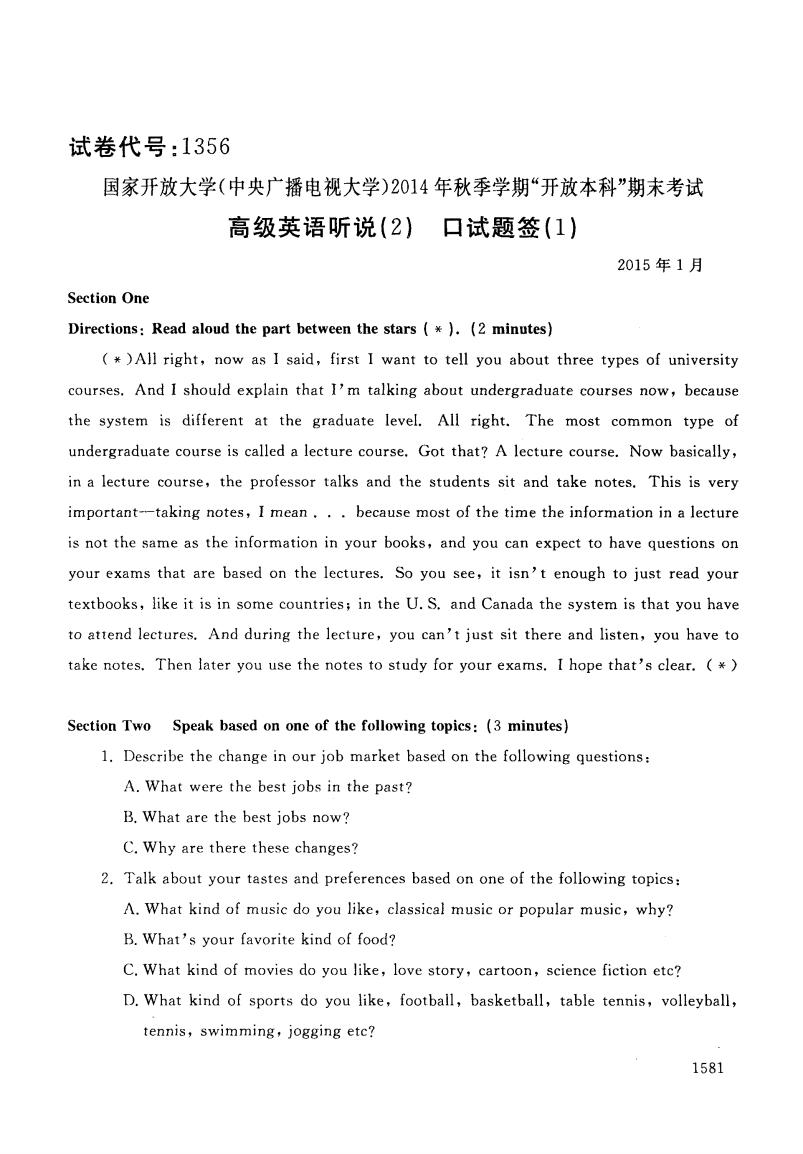
试卷代号:1356 国家开放大学(中央广播电视大学)2014年秋季学期“开放本科”期末考试 高级英语听说(2)口试题签(1) 2015年1月 Section One Directions:Read aloud the part between the stars (*)(2 minutes) (*)All right,now as I said,first I want to tell you about three types of university courses.And I should explain that I'm talking about undergraduate courses now,because the system is different at the graduate level.All right.The most common type of undergraduate course is called a lecture course.Got that?A lecture course.Now basically, in a lecture course,the professor talks and the students sit and take notes.This is very important-taking notes,I mean...because most of the time the information in a lecture is not the same as the information in your books,and you can expect to have questions on your exams that are based on the lectures.So you see,it isn't enough to just read your textbooks,like it is in some countries;in the U.S.and Canada the system is that you have to attend lectures.And during the lecture,you can't just sit there and listen,you have to take notes.Then later you use the notes to study for your exams.I hope that's clear.(* Section Two Speak based on one of the following topics:(3 minutes) 1.Describe the change in our job market based on the following questions: A.What were the best jobs in the past? B.What are the best jobs now? C.Why are there these changes? 2.Talk about your tastes and preferences based on one of the following topics: A.What kind of music do you like,classical music or popular music,why? B.What's your favorite kind of food? C.What kind of movies do you like,love story,cartoon,science fiction etc? D.What kind of sports do you like,football,basketball,table tennis,volleyball, tennis,swimming,jogging etc? 1581
试卷代号 :1356 国家开放大学(中央广播电视大学)2014 年秋季学期"开放本科"期末考试 高级英语昕说 (2 ) 口试题签 (1 ) 2015 Section One Directions: Read aloud the part between the stars (关). (2 minutes) (快) All right , now as 1 said. first 1 want to tell you about three types of university courses. And 1 should explain that l' m talking about undergraduate courses now , because the system is different at the graduate level. All right. The most common type of undergraduate course is called a lecture course. Got that? A lecture course. Now basically , in a lecture course , the professor talks and the students sit and take notes. This is very important-taking notes, 1 mean. . . because most of the time the information in a lecture is not the same as the information in your books, and you can expect to have questions on your exams that are based on the lectures. So you see , it isn' t enough to just read your textbooks, like it is in some countries; in the U. S. and Canada the system is that you have to attend lectures. And during the lecture , you can't just sit there and listen , you have to tak notes. Then later you use the notes to study for your exams. 1 hope that's clear. (并〉 Section Two Speak based on one of the following topics: (3 minutes) 1. Describe the change in our job market based on the following questions: A. What were the best jobs in the past? B. What are the best jobs now? Thy are there these changes? 2. Talk about your tastes and preferences based on one of the fol1owing topics: A. What kind of music do you like , classical music or popular music , why? B. What' s your favorite kind of food? C. What kind of movies do you like , love story , cartoon , science fictÌon etc? D. What kind of sports do you like , football , basketball , table tennis, volleybal1, tennis, swimming , jogging etc? 1581